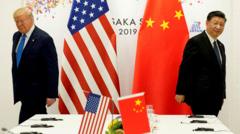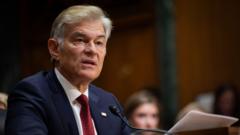The European Union braces for repercussions from President Trump's newly imposed tariffs on EU goods, signaling a potential trade war. Leaders from various countries express their concerns while strategizing coordinated responses to safeguard their economies, revealing vulnerabilities and the balance of trade between the EU and the US.
European Union Faces Crossroads Amid Trump's New Tariffs

European Union Faces Crossroads Amid Trump's New Tariffs
EU leaders rally in response to President Trump's latest tariffs, reflecting on economic impacts and potential strategies for retaliation.
European leaders are responding to President Donald Trump's recent announcement of a 20% tariff on EU goods with alarm and introspection. Germany’s outgoing Chancellor, Olaf Scholz, criticized the tariffs as fundamentally wrong, while Spain’s Prime Minister, Pedro Sánchez, labeled them a unilateral attack. French President Emmanuel Macron described the decision as brutal, asserting that it would have a massive impact on the European economy, prompting him to convene an emergency meeting with French businesses facing significant repercussions.
With the tariffs targeting key sectors such as wine, automotive, and luxury goods, countries are preparing to weather the storm. France's wine and cognac producers stand to lose millions, with cognac particularly popular in the US music scene. Spain’s olive oil and gas turbine exports are also at risk, alongside EU industries like chemicals and machinery, which are now under a cloud of uncertainty due to these increased import taxes.
Analysis of GDP exposure reveals Ireland as notably reliant on the US market, with one-fifth of its economy linked to goods and services, many stemming from pharmaceuticals and tech sectors. Other countries such as Luxembourg and Belgium also exhibit higher exposure rates, potentially facing substantial economic challenges due to the tariffs.
In Brussels, the European Commission, led by Ursula von der Leyen, is coordinating a unified response. The EU recognizes its strategic position as a major global trade power, representing 22% of global GDP compared to the US’s 25%. However, relations between the two powers are fragile, especially given recent disagreements on defense spending and Russia's actions in Ukraine.
Thus, the EU's approach may involve leveraging negotiations rather than immediate retaliation. The overarching strategy appears to be a blend of hope for diplomatic resolution and the ability to wield economic influence. Potential retaliatory measures may include targeting US services, looking particularly at tech giants like Apple and Amazon—a move fraught with risks of escalating tensions.
While the EU contemplates various bargaining chips, including increasing imports of US liquefied natural gas, the path forward is complex. Each proposed action poses trade-offs that may disrupt commitments within the EU or provoke further backlash from the US.
As uncertainty looms over global trade, EU officials are expressing grave concerns over a possible collapse of the international trading system. They are also contemplating internal economic reforms to reduce barriers within the EU single market, which the IMF estimates could substantially elevate competitiveness and growth in light of the tariffs imposed by the US.
In a landscape demanding unity and strategic foresight, the EU faces its most pressing challenge yet in navigating the fallout from Trump's trade policies, balancing immediate economic needs with longer-term solidarity among its member states.






















